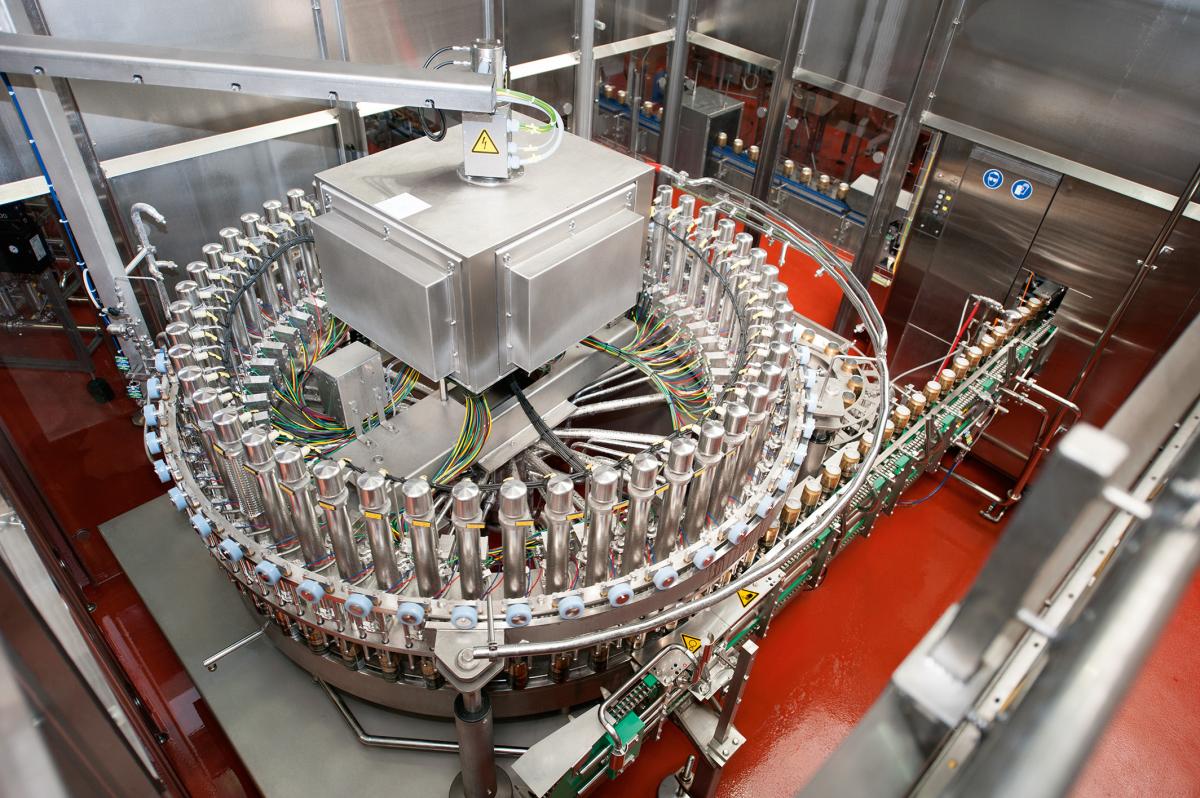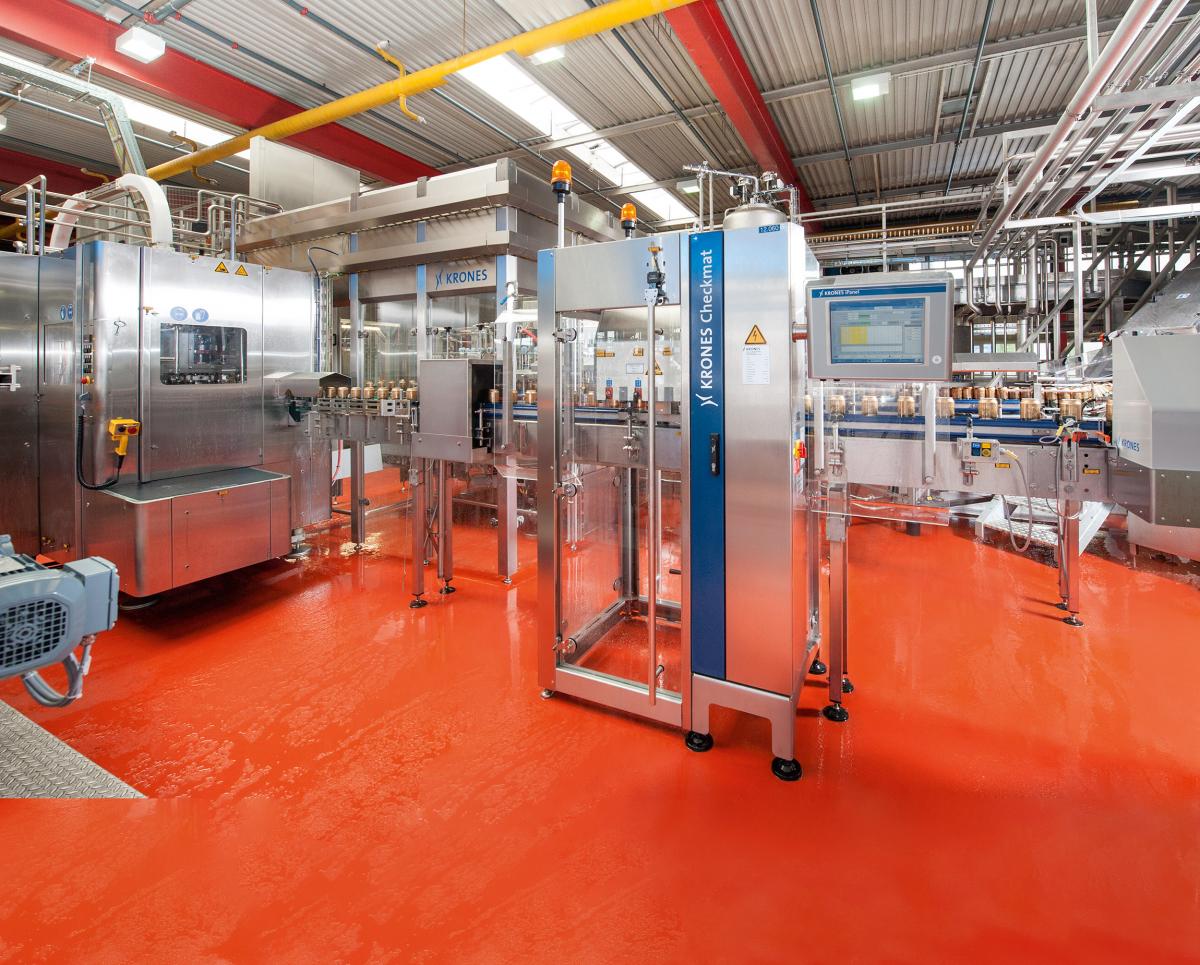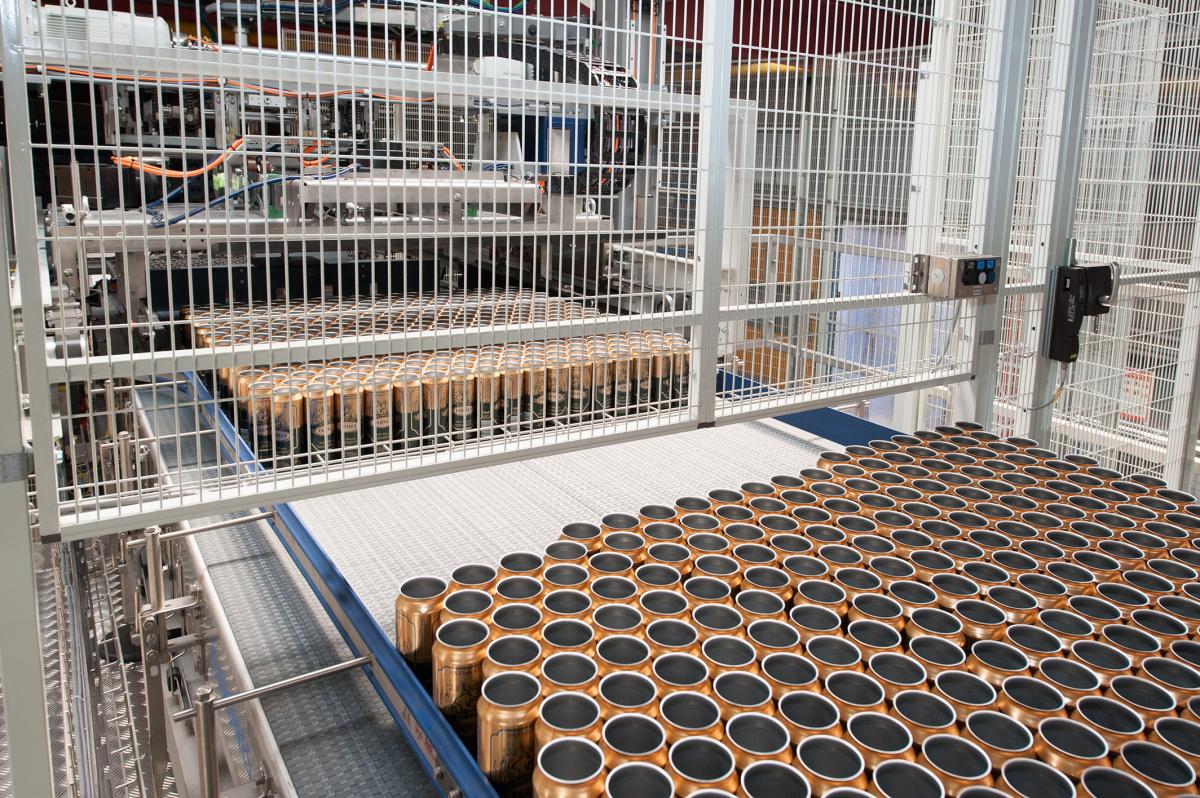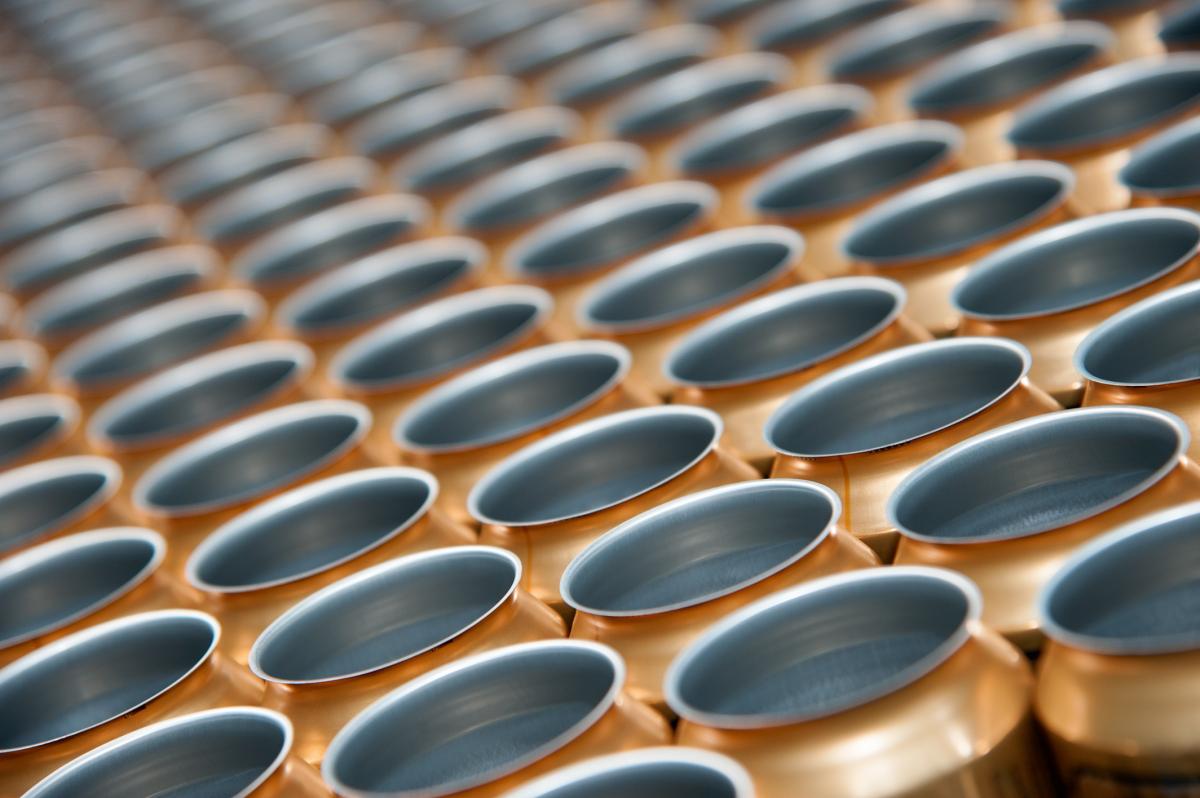In Hochdorf in the Swiss canton of Lucerne, the Ramseier Suisse AG company operates the country’s largest independent brewery. This facility concentrates solely on the production and filling of dealer’s brands. To enable the rising demand for beer in aluminium cans to be met, Ramseier has now installed a canning line from Krones in Hochdorf next to the glass line. And it’s running like clockwork.
Ramseier Suisse AG, with around 300 employees and a turnover of 156 million Swiss francs (2014), is one of Switzerland’s most prestigious companies.
The company offers, as a private label, production capacities and filling options in glass, PET, soft-packages, and most recently cans as well – for fruit juice, sweet beverages, ice tea, mineral water or beer. At the fourth facility in Hochdorf near Lucerne, the beverage specialist has focused on producing and filling beer, plus small quantities of syrup.
The production plant in Hochdorf evolved from the former Lupo Brewery, which had been producing beer since 1963 – from 1967 onwards, primarily a house brand for the discounter Denner – and had been integrated into the fenaco Group in 2006. Lupo was one of the few Swiss breweries that did not belong to the beer cartel: this regulated the market from 1935 to 1991, not least with defined territory allocations for each member brewery, and price maintenance. When in 1991 the cartel ended following the successive withdrawal of three large breweries, the Swiss brewing industry was faced with an entirely new situation: firstly, there was a massive wave of concentration, with numerous mergers among the established breweries, which ultimately led to takeovers by Heineken and Carlsberg, who together nowadays cover about 60 per cent of domestic consumption. Secondly, a boom commenced in small-brewery start-ups: in 1985, there were only 34 breweries in Switzerland, whereas by 2014 this figure had soared to 478. In parallel, however, the proportion of imported beers also rose, from 13.7 per cent in 1991 to its present 26.3 per cent, while per-capita consumption fell in the same period from 71 liters to 57 liters, significantly below the European average of 70 liters.

The Volumetic VOC can filler has no front table, and is erected with a free-standing glass enclosure

A Checkmat FM-X inspects the cans for the correct fill levels
Switzerland’s biggest independent brewery
Nowadays, Ramseier Suisse AG’s brewing facility in Hochdorf is Switzerland biggest brewery that’s not dependent on a foreign conglomerate, and in 2014 achieved an output of 260,000 hectoliters. The brewery concentrates entirely on producing dealer’s brands. The customers include the LANDI and Volg retail chains, owned by the fenaco Group.
Hitherto, the plant in Hochdorf had been operating with a single bottling line: rated at 33,000 bottles per hour for returnable and non-returnable glass bottles and for PET containers in the 0.33-liter, 0.5-liter and 1.0-liter sizes, most of it installed by Krones in 2000.
Demand for canned beer in the retail sector has soared in recent years – meanwhile one in three beers on the shop shelves is being sold in cans. This is why Ramseier Suisse AG decided to progress its expansion thrust in the beer segment, and to further upgrade its value creation chain by installing a new canning line. “Competitors from abroad, particularly from Germany, constitute serious rivals when it comes to contract beer canning,” says Kurt Felder, Plant Manager in Hochdorf. Ramseier Suisse AG accordingly decided before the end of 2013 to invest in a canning operation of its own. By doing so, the company wanted to upgrade its perceived competence as a beverage specialist and production partner. With great success: from 2014 to 2015, Hochdorf increased its beer production output by around 30 per cent, from 200,000 to 260,000 hectoliters. “The aluminium beverage can was for years perceived by the public as an ‘environmental sinner’.
Thanks to minimized energy consumption during production, and their reduced weight, however, nowadays beverage cans do very much better in life-cycle analyses than they did ten years ago. Meanwhile, cans exhibit figures of similar quality to those for PET bottles, and have long since surpassed non-returnable glass,” to quote the company. Switzerland, moreover, possesses a superbly organised, regionally networked recycling system: even without charging a deposit, the recycling rate for aluminium cans is running at over 90 per cent.
Turnkey order for the canning line’s wet end
In December 2013, Ramseier Suisse AG placed a turnkey order with Krones for the wet end of the canning line. The machines were delivered in May 2014, with commissioning completed in June. “We felt it was important to have the delivery capability in place before the peak season began,” explains Kurt Felder. “This was accomplished to perfection – Krones did a brilliant job.”
The company decided to use the dry end of the existing glass bottling line for both the glass line and the new canning line – alternately, of course. Because there was already an end-of-the-line packer integrated there for six-packs plus 18- and 24-bottle shrink-packs with and without trays. The space available would not have permitted separate end-of-the-line packaging and palletising for the canning line. “At present we’re running two or three shifts on five days a week. We could, of course, increase our filling capacities still further by running the line 24 hours a day, seven days a week.” explains Kurt Felder.

A Pressant Universal 1A sweep-off depalletiser feeds the bulk cans, which are delivered in stacks of 15 layers, into the line on a raised level
Can filler for ultra-accurate fill quantities
A Pressant Universal 1A sweep-off depalletiser feeds the bulk cans, which are delivered in stacks of 15 layers, into the line on a raised level. After a short conveyor section, an inclined rinser passes the cans down to the Volumetic VOC filler. Its filling principle, featuring metering chambers, guarantees ultra-accurate fill quantities: before the product enters the can, it first flows into a metering chamber, where the inflowing liquid is monitored by a probe with a magnetic float. Once the specified quantity has been reached, the inlet valve closes. While the can is entering the filler, the centring unit rises, and descends again as soon as the can has been placed underneath the filling valve. After pressurisation and flushing, the valve opens. As soon as the magnetic float in the metering chamber has descended to the specified switching point, the filling function ends. The Volumetic VOC can filler has no front table, and is erected with a free-standing glass enclosure. The protected area also accommodates a Ferrum can seamer, in the new hygienic design. A Checkmat FM-X then inspects the cans for the correct fill levels. Now a first Linadry dries the filled and seamed cans in single-file transport. After this, the containers are turned by 180 degrees, and passed through a second Linadry. The cans can now be reliably date-coded, and passed to the packer for end-of-the-line packaging.

The line currently handles 0.5-liter cans only. It can, however, in future also provide an option for handling 0.25-liter and 0.33-liter slim and sleek-cans. Lubricants from KIC Krones ensure optimum protection for the kit at Ramseier Suisse AG.
A persuasive overall concept
“It was Krones’ overall concept that we found so persuasive when reaching this decision,” explains Kurt Felder. “It wasn’t the cheapest quotation, that’s true, but if you look at the package as a whole, we thought it was definitely the most favourable for us. Ramseier has in the past been very satisfied with its Krones kit: not only in regard to layouts and specialised competences, but also in terms of professionalism, project management and cooperation, plus the entire service support provided by both Krones Switzerland and Krones AG in Germany.”
|
Ramseier Suisse AG possesses vast in-house expertise, particularly in the fruit juice segment. With four juice processing plants, the company is Switzerland’s biggest producer of fruit juice, and every year handles up to 70,000 tons of fruit from more than 7,000 fruit farmers, representing about 50 to 60 per cent of Switzerland’s total juicing fruit. At two of the four juice processing plants, in Sursee and Kiesen, Ramseier Suisse AG has also installed filling capacities. And there are two other production facilities, in Elm and Hochdorf. Elm concentrates mainly on filling the Elmer Citro and Mineral brands. In addition, Ramseier’s product range likewise incudes the cult brand Sinalco. These brands are sold in all the major channels of Switzerland’s retail sector, and also numerous catering outlets. |
Air Jordan 1

 iConnectHub
iConnectHub
 Login/Register
Login/Register Supplier Login
Supplier Login



























